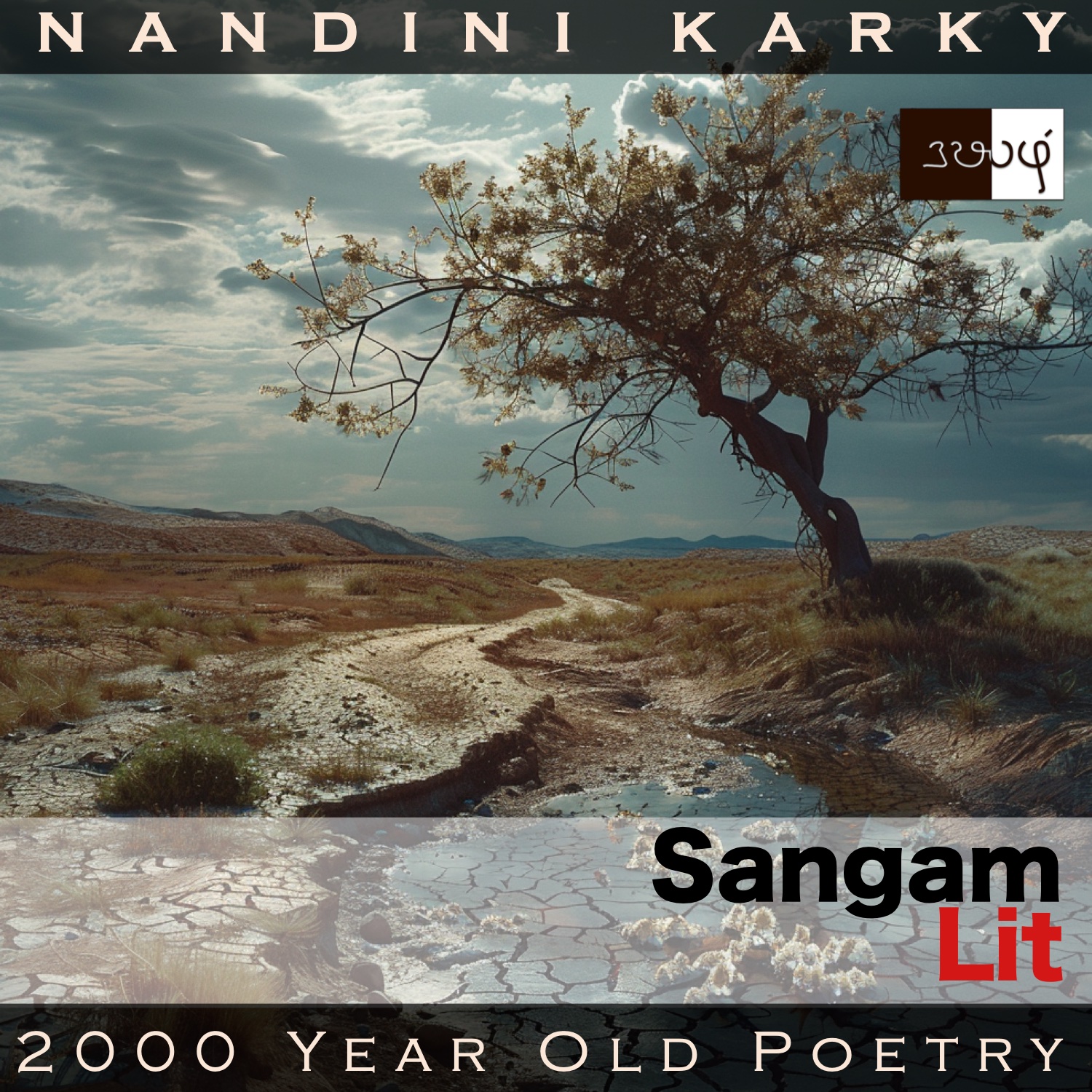Podcast: Play in new window | Download
Subscribe: Apple Podcasts | Spotify | Amazon Music | Android | iHeartRadio | TuneIn | RSS | More
In this episode, we listen to a conversation about the man’s parting, as portrayed in Sangam Literary work, Kalithogai 3, penned by the Chera King Paalai Paadiya Perunkadunko. The verse is situated in the ‘Paalai’ or ‘Drylands landscape’ and reveals the impact of nature on human emotions.

அறன் இன்றி அயல் தூற்றும் அம்பலை நாணியும்,
வறன் நீந்தி நீ செல்லும் நீள் இடை நினைப்பவும்
இறை நில்லா வளை ஓட, இதழ் சோர்பு பனி மல்க,
பொறை நில்லா நோயோடு புல்லென்ற நுதல் இவள்
விறல் நலன் இழப்பவும், வினை வேட்டாய்! கேஎள், இனி:
‘உடை இவள் உயிர் வாழாள், நீ நீப்பின்’ என, பல
இடைகொண்டு யாம் இரப்பவும், எம கொள்ளாய்ஆயினை;
கடைஇய ஆற்றிடை, நீர் நீத்த வறுஞ் சுனை,
அடையொடு வாடிய அணி மலர் தகைப்பன
‘வல்லை நீ துறப்பாயேல், வகை வாடும் இவள்’ என,
ஒல் ஆங்கு யாம் இரப்பவும், உணர்ந்தீயாய் ஆயினை;
செல்லு நீள் ஆற்றிடை, சேர்ந்து எழுந்த மரம் வாட,
புல்லு விட்டு இறைஞ்சிய பூங்கொடி தகைப்பன
‘பிணிபு நீ விடல் சூழின், பிறழ்தரும் இவள்’ என,
பணிபு வந்து இரப்பவும், பல சூழ்வாய்ஆயினை;
துணிபு நீ செலக் கண்ட ஆற்றிடை, அம் மரத்து
அணி செல, வாடிய அம் தளிர் தகைப்பன
என ஆங்கு
யாம் நிற் கூறவும் எம கொள்ளாய்ஆயினை;
ஆனாது இவள்போல் அருள் வந்தவை காட்டி,
மேல் நின்று மெய் கூறும் கேளிர் போல், நீ செல்லும்
கானம் தகைப்ப, செலவு.
Yet again, we perceive the confidante’s efforts to stop the man from parting away. The verse can be translated as follows:
“Feeling ashamed thinking about the unjust town’s gossip that would follow, and worrying about the long and winding path you would walk on to cross the drylands, her bangles, refusing to stay on her forearms, would slip away, and her petal-like eyes would fill with fatigue and pool with tears. This unbearable affliction would make her forehead lack lustre and she would lose her great beauty. Even after knowing all this, you are still focused on your task. Listen to me now:
Saying ‘If you part, she who thinks of you as her life, will live no more’, even though I plead in many different ways, you accept it not; In that path you will cross, upon a dried-up pond, bereft of water, a string of beautiful flowers, which have faded along with the leaves, will stop you.
Saying, ‘If you part away so soon, her many beautiful qualities will fade’, even though I plead in the proper manner, you understand it not; In the long path you will travel to, as a soaring tree fades, the flower-filled vines, which have let go of their hold and fallen down listlessly, will stop you.
Saying, ‘If you part letting go of your hold, she will part with her life’, even though I plead with humility, you still are considering your journey; In that path that you dare to leave to, the leaves, which have faded, making the tree’s beauty perish, will stop you.
You heed not these many words I have rendered to you. However, unceasingly showing you scenes that will appear like her, in the manner of elders, who speak the truth with authority, the forest you traverse to, will stop your journey!”
Let’s explore the nuances. Like the previous verse, this too is set in the context of a man’s parting from his lady after marriage. Here, the words are rendered by the confidante to the man. She starts by listing the different kinds of distress that would fall upon the lady if the man happens to part away. The very first thing she says is that the town would gossip. What’s there to gossip if the man leaves on a mission after his marriage? Perhaps they would think the man has abandoned the woman he married! In any case, the worry about these rumours and the worry about the man’s travel would make the lady’s bangles slip away, eyes well with tears, fade the lustre of her forehead and in short, lose her exquisite beauty. The confidante turns to the man and says even though he knows very well about all this, he still wants to leave. Now, she starts putting forth her arguments to him.
In both the verses of Kalithogai we have seen thus far, there’s the same structure, with an introduction of context, and then three different ways of putting forth a point, followed by a conclusion. In the middle portion containing three different segments, the confidante talks about how she has pleaded to the man saying the lady will lose her beauty and will even lose her life, if the man parts away. And yet in all three cases, he refuses to understand it, accept it and continues to make plans for his travel. At this juncture, the confidante visualises three different scenes in the drylands path he will travel to: One, a dried-up pond where a string of once-beautiful flowers lie faded; Two, where flowering vines which were twirling around a tree, wither away and fall to the ground, and lie there listlessly; And three, the leaves which used to adorn the tree, lie scorched and dried up. Now, the confidante concludes with the words that even though the man listens not to the many words she has said to him, such scenes will appear and remind him of his lady’s state, and will block him from even taking a single step towards his mission, just the way wise elders would advise one from a position of authority and clarity.
A verse which demonstrates the truth that we see the world not as it is, but as who we are! Undoubtedly, the man’s worry about the lady will come back with force, when he’s journeying through the harsh drylands seeing those withering sights around him. And with wisdom, the confidante predicts that the man will feel it’s not just the outer world in such a state of ruin but rather it’s his beloved. In a tangent, the verse shows the deep influence that nature has on the people of the Sangam era, and their awareness and understanding of this timeless truth!




Share your thoughts...